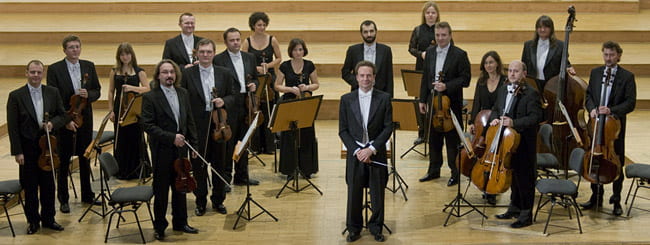Polish Music Newsletter Vol. 17, no. 3
PMC News
Polish Music: The New Generation
On March 26, 2011 at 4:00 p.m. in USC’s Newman Recital Hall, the Polish Music Center will present a concert featuring trend-setters in Polish contemporary music. Members of what is generally referred to as the “Glissando Generation” (named after a Polish music periodical covering avant-garde music and art), Wojtek Blecharz, Mikołaj Górecki, Jarosław Kapuściński, Robert Pierzak, Ewa Trębacz, and Krzysztof Wołek represent a wide spectrum of musical styles and approaches. These young composers, who have already made their mark on the international scene with numerous commissions and performances of their works, will be present to discuss their music and their compositional process. The concert will be capped with a special performance by filmmaker David Lynch, appearing in a duet of free improvisations with pianist Marek Żebrowski. Other performers include: Josiah Boothby, French horn, Aurelien Eulert, piano, Eric Jacobs, clarinet, Yevgeniy Milyavskiy, piano, Sara Sumitani, piano, Amy tatum, flute.
 Wojtek Blecharz, currently pursuing a doctoral degree in composition at UC San Diego, has already been recognized with a number of international prizes for his compositions as well as for performances as an oboist. He has received commissions from the Poznań Music Spring Festival, Polish Composers’ Union, Ensemble Intégrales, Kwartludium Ensemble, clarinetist Michael E. Richards, and Royal String Quartet, and wrote music for the Silesian Dance Theatre, Kokoro Dance Ensemble in Vancouver, City Dance Ensemble in Washington, Fringe Festival for Arts in Philadelphia, Ballet Met in Ohio, Rotterdamse Dansacademie, and theatres throughout Poland. Mr. Blecharz will be represented on the March 26 program with a 2008 composition, Com/m/a for flute and clarinet, performed by flutist Amy Tatum and clarinetist Eric Jacobs.
Wojtek Blecharz, currently pursuing a doctoral degree in composition at UC San Diego, has already been recognized with a number of international prizes for his compositions as well as for performances as an oboist. He has received commissions from the Poznań Music Spring Festival, Polish Composers’ Union, Ensemble Intégrales, Kwartludium Ensemble, clarinetist Michael E. Richards, and Royal String Quartet, and wrote music for the Silesian Dance Theatre, Kokoro Dance Ensemble in Vancouver, City Dance Ensemble in Washington, Fringe Festival for Arts in Philadelphia, Ballet Met in Ohio, Rotterdamse Dansacademie, and theatres throughout Poland. Mr. Blecharz will be represented on the March 26 program with a 2008 composition, Com/m/a for flute and clarinet, performed by flutist Amy Tatum and clarinetist Eric Jacobs.
 Mikołaj Górecki, son of the late Henryk Mikołaj Górecki, is also a composer and currently serves on the faculty of Laredo Community College. He studied composition at the Katowice Music Academy with his father and graduated with honors in 1995. A scholarship student at the Banff Centre for the Arts in Canada during 1996-1997, Mr. Górecki received a doctorate in composition in 2000 from Indiana University in Bloomington. His music has been performed worldwide, including De Ijsbrejer Centre in Amsterdam, Avery Fisher Hall in New York, as well as venues in Montreal, Quebec City, Victoria, Edmonton, Washington, DC, and the World Music Days ISCM Festival in Slovenia. His Sonata for Two Pianos was written in 2005 and will be given its World Premiere at the March 26 Polish Music Center concert by piano duo Aurelien Eulert and Sara Sumitami.
Mikołaj Górecki, son of the late Henryk Mikołaj Górecki, is also a composer and currently serves on the faculty of Laredo Community College. He studied composition at the Katowice Music Academy with his father and graduated with honors in 1995. A scholarship student at the Banff Centre for the Arts in Canada during 1996-1997, Mr. Górecki received a doctorate in composition in 2000 from Indiana University in Bloomington. His music has been performed worldwide, including De Ijsbrejer Centre in Amsterdam, Avery Fisher Hall in New York, as well as venues in Montreal, Quebec City, Victoria, Edmonton, Washington, DC, and the World Music Days ISCM Festival in Slovenia. His Sonata for Two Pianos was written in 2005 and will be given its World Premiere at the March 26 Polish Music Center concert by piano duo Aurelien Eulert and Sara Sumitami.
 Jarosław Kapuściński, a composer and pianist, is a graduate of Warsaw Academy of Music and Banff Centre for the Arts and received his doctorate in composition from UC San Diego in 1997. Currently he is Assistant Professor of composition in the Department of Music at Stanford University, and directs the Intermedia Performance Lab at Stanford’s Center for Computer Research in Music and Acoustics (CCRMA). He has also taught at McGill University in Montreal, Royal Academy of Arts and Music in The Hague, Art Conservatory and Music Academy in Odense, Conservatory of Music at University of the Pacific, and has lectured internationally. Kapuściński’s primary interest is the creation and performance of works in which musical instruments are used to control multimedia content and the composer will perform his 2009 composition Juicy for Piano and Video.
Jarosław Kapuściński, a composer and pianist, is a graduate of Warsaw Academy of Music and Banff Centre for the Arts and received his doctorate in composition from UC San Diego in 1997. Currently he is Assistant Professor of composition in the Department of Music at Stanford University, and directs the Intermedia Performance Lab at Stanford’s Center for Computer Research in Music and Acoustics (CCRMA). He has also taught at McGill University in Montreal, Royal Academy of Arts and Music in The Hague, Art Conservatory and Music Academy in Odense, Conservatory of Music at University of the Pacific, and has lectured internationally. Kapuściński’s primary interest is the creation and performance of works in which musical instruments are used to control multimedia content and the composer will perform his 2009 composition Juicy for Piano and Video.
Robert Pierzak is a composer and conductor who writes vocal, electronic, and instrumental music. He studied composition at Ithaca College and the Eastman School of Music with Mario Davidovsky, Phillipe Manoury, Robert Morris, Chinary Ung, Dana Wilson, and Gregory Woodward. Mr. Pierzak is currently in the PhD program in composition at UC San Diego. He is the recipient of the BMI Student Composer Award, the Howard Hanson Large Ensemble Prize, the Smadbeck Composition Award, and the Yale College Composer’s Group High School Composition Award. His music has been performed throughout the U.S. Mr. Pierzak’s composition, I’m Underwater for Piano Solo(2008) will be performed by pianist Yevgeniy Milyavskiy.
 Ewa Trębacz is a composer and media artist living in Seattle and teaching at the University of Washington’s Center for Digital Arts and Experimental Media (DXARTS). A graduate of Kraków Music Academy in the composition class of Bogusław Schaeffer, Ms. Trębacz received her Ph.D. from the University of Washington, where she studied computer music with Richard Karpen and Juan Pampin, and experimental video with Shawn Brixey. Ewa Trębacz’s works include instrumental solo, chamber, and symphonic compositions as well as computer realized sound with live performance, soundtracks for animated films, and experimental stereoscopic video. She was commissioned by the Klangspuren Festival in Austria and the International Contemporary Music Festival Warsaw Autumn in Poland and recognized by the 56th UNESCO International Rostrum of Composers in Paris in 2009 for her work things lost things invisible for ambisonic space and orchestra, which resulted in multiple radio broadcasts on four continents. Her 2005 work, Minotaur for Horn and Surround Sound will be performed by Josiah Boothby, who collaborated with Ms. Trębacz on this composition.
Ewa Trębacz is a composer and media artist living in Seattle and teaching at the University of Washington’s Center for Digital Arts and Experimental Media (DXARTS). A graduate of Kraków Music Academy in the composition class of Bogusław Schaeffer, Ms. Trębacz received her Ph.D. from the University of Washington, where she studied computer music with Richard Karpen and Juan Pampin, and experimental video with Shawn Brixey. Ewa Trębacz’s works include instrumental solo, chamber, and symphonic compositions as well as computer realized sound with live performance, soundtracks for animated films, and experimental stereoscopic video. She was commissioned by the Klangspuren Festival in Austria and the International Contemporary Music Festival Warsaw Autumn in Poland and recognized by the 56th UNESCO International Rostrum of Composers in Paris in 2009 for her work things lost things invisible for ambisonic space and orchestra, which resulted in multiple radio broadcasts on four continents. Her 2005 work, Minotaur for Horn and Surround Sound will be performed by Josiah Boothby, who collaborated with Ms. Trębacz on this composition.
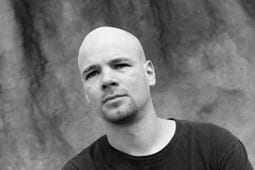 Krzysztof Wołek has studied composition with Edward Bogusławski, Louis Andriessen, Marta Ptaszyńska, Shulamit Ran, and Howard Sandroff and received his Ph.D. in composition and computer music from the University of Chicago. He has taught composition, electronic music, and theory at the Academy of Music in Katowice, Columbia College Chicago, University of Chicago, and, most recently, as Assistant Professor of Music Composition and Director of Digital Composition Studies at the University of Louisville. Krzysztof Wołek also serves on the jury of the Grawemeyer Award, is a Programming Committee Member of the Warsaw Autumn Festival, and is the Director of the University of Louisville New Music Festival. His works have been performed at the Warsaw Autumn Festival, SEAMUS, SPARK, International Computer Music Conference, Audio Art Festival, Musica Polonica Nova, and the ISCM World Music Days. He has received commissions from the Warsaw Autumn Festival, the Siemens Foundation, SCI/ASCAP as well as awards and grants from the Chicago Arts Grant, the Concours Internationaux de Musique et d’Art Sonore Electroacoustiques, the MISAME Association, and the Bourge Competition. His 2009 Arguro for Flutes and Live Electronicswill be performed by flutist Michael Matsuno.
Krzysztof Wołek has studied composition with Edward Bogusławski, Louis Andriessen, Marta Ptaszyńska, Shulamit Ran, and Howard Sandroff and received his Ph.D. in composition and computer music from the University of Chicago. He has taught composition, electronic music, and theory at the Academy of Music in Katowice, Columbia College Chicago, University of Chicago, and, most recently, as Assistant Professor of Music Composition and Director of Digital Composition Studies at the University of Louisville. Krzysztof Wołek also serves on the jury of the Grawemeyer Award, is a Programming Committee Member of the Warsaw Autumn Festival, and is the Director of the University of Louisville New Music Festival. His works have been performed at the Warsaw Autumn Festival, SEAMUS, SPARK, International Computer Music Conference, Audio Art Festival, Musica Polonica Nova, and the ISCM World Music Days. He has received commissions from the Warsaw Autumn Festival, the Siemens Foundation, SCI/ASCAP as well as awards and grants from the Chicago Arts Grant, the Concours Internationaux de Musique et d’Art Sonore Electroacoustiques, the MISAME Association, and the Bourge Competition. His 2009 Arguro for Flutes and Live Electronicswill be performed by flutist Michael Matsuno.
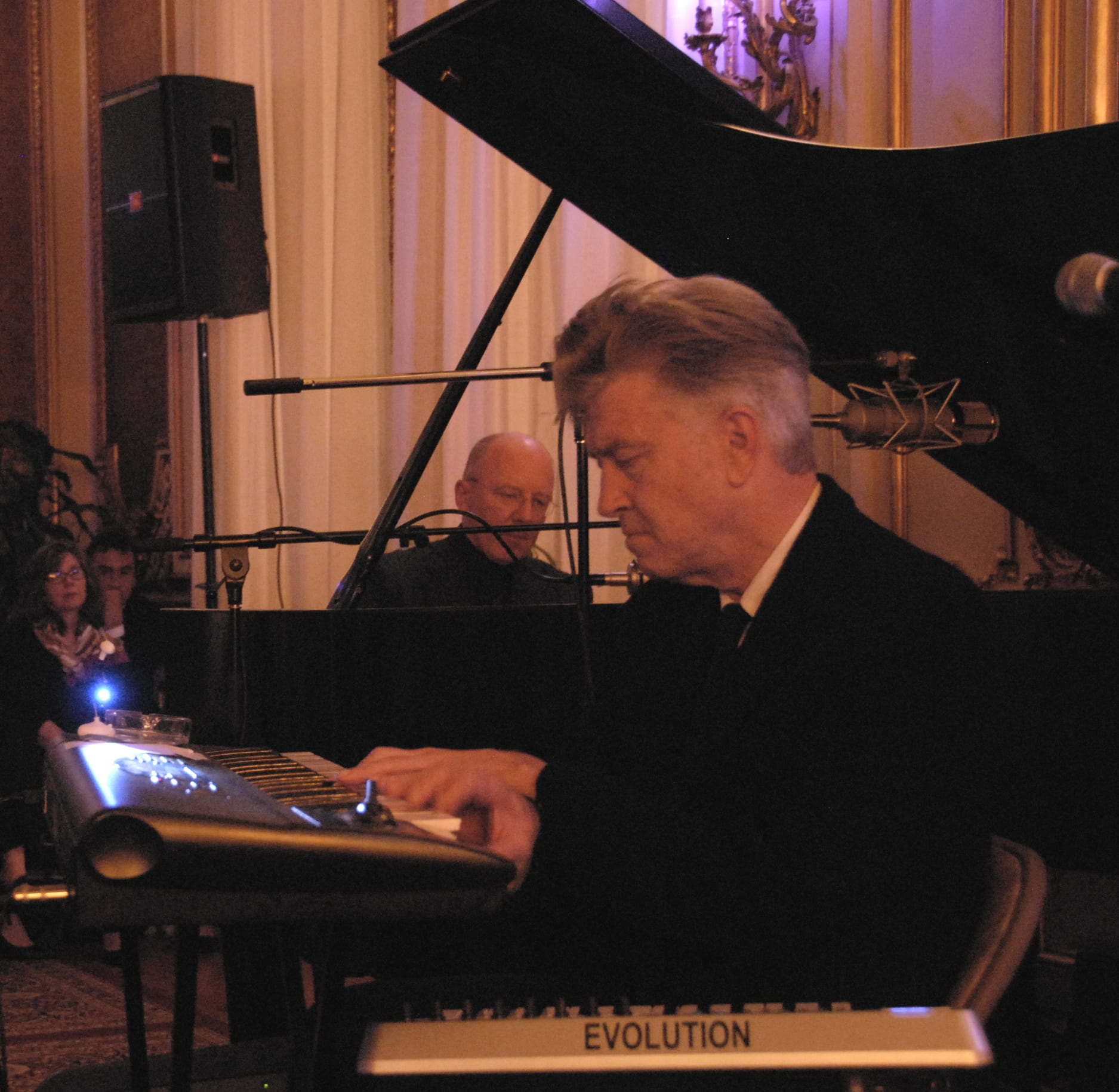 David Lynch, a visionary filmmaker, is also a keen musician and enthusiast of Polish avant-garde music. For several years he has collaborated with pianist Marek Żebrowski on exploring musical inspiration in free-form improvisations. After a period of in-studio experiments and recordings in the early 2000s, Lynch (on electronic keyboards) and Żebrowski (at the piano), have performed live in Paris, Milan, Łódź, Gdańsk, Los Angeles, New York, and Washington. Their CD Polish Night Music, featuring several extended improvisations, was released in 2008. Their performance at the March 26 PMC concert will include a brief introduction by Mr. Lynch with music—created on the spot—to follow.
David Lynch, a visionary filmmaker, is also a keen musician and enthusiast of Polish avant-garde music. For several years he has collaborated with pianist Marek Żebrowski on exploring musical inspiration in free-form improvisations. After a period of in-studio experiments and recordings in the early 2000s, Lynch (on electronic keyboards) and Żebrowski (at the piano), have performed live in Paris, Milan, Łódź, Gdańsk, Los Angeles, New York, and Washington. Their CD Polish Night Music, featuring several extended improvisations, was released in 2008. Their performance at the March 26 PMC concert will include a brief introduction by Mr. Lynch with music—created on the spot—to follow.
The admission to the concert is free and open to the public. Paid parking ($8) is available in Structure X on the USC campus. For more information please contact: Polish Music Center, University of Southern California, Los Angeles, CA 90089-0851, or call 213. 821. 1356. E-mail: polmusic@thornton.usc.edu. See you there!
Saturday, March 26, 2011 | 4:00 p.m.
POLISH MUSIC: THE NEW GENERATION
University of Southern California – Newman Recital Hall
Los Angeles, CA 90089
Admission: FREE
Info: www.usc.edu/dept/polish_music/ | 213.821.1356 | polmusic@thornton.usc.edu
CD Donation By Maestro Smolij
In late February, we received a donation of several CDs featuring performances by Maestro Mariusz Smolij. The following CD albums have now been added to the Polish Music Center Library:
Tadeusz Szeligowski: Comedy Overture (1952); Four Polish Dances (1954); Piano Concerto (1941); Nocturne for Orchestra (1947); and Concerto for Orchestra (1930). Poznań Philharmonic Orchestra is conducted by Maestro Smolij on this NAXOS 8.570371 CD. The performers also include pianist Bogdan Czapiewski and violinist Anna Ziółkowska.
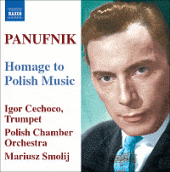 Andrzej Panufnik: Old Polish Suite for String Orchestra; Concerto in Modo antico—Jagiellonian Triptych for String Orchestra; Old Polish Music: Divertimento after Janiewicz; Hommage a Chopin: and Five Pieces for Flute and String Orchestra. The soloists include Igor Cechoco, trumpet, and Hanna Turonek, Flute. Polish Chamber Orchestra is led by Maestro Smolij on this NAXOS 8.570032 CD.
Andrzej Panufnik: Old Polish Suite for String Orchestra; Concerto in Modo antico—Jagiellonian Triptych for String Orchestra; Old Polish Music: Divertimento after Janiewicz; Hommage a Chopin: and Five Pieces for Flute and String Orchestra. The soloists include Igor Cechoco, trumpet, and Hanna Turonek, Flute. Polish Chamber Orchestra is led by Maestro Smolij on this NAXOS 8.570032 CD.
Miklós Rózsa: Concerto for Viola and Orchestra, Op. 37 and Hungarian Serenade, Op. 25. The soloist is violist Gilad Karni and the Budapest Concert Orchestra is led by Maestro Smolij on this NAXOS 8.570925 CD.
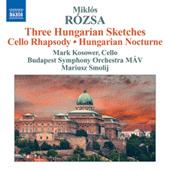 Miklós Rózsa: Overture to a Symphony Concert, Op. 26a; Rhapsody for Cello and Orchestra, Op. 3; Notturno ungherese, Op. 28; and Three Ungarian Sketches, Op. 14. Mark Kosower is the cello soloist here and the Budapest Symphony Orchestra is under the direction of Maestro Smolij on this NAXOS 8.572285 CD.
Miklós Rózsa: Overture to a Symphony Concert, Op. 26a; Rhapsody for Cello and Orchestra, Op. 3; Notturno ungherese, Op. 28; and Three Ungarian Sketches, Op. 14. Mark Kosower is the cello soloist here and the Budapest Symphony Orchestra is under the direction of Maestro Smolij on this NAXOS 8.572285 CD.
 Maestro Smolij also included in his CD donation a recording released by the Kosciuszko Foundation in New York City, featuring pianist Adam Makowicz and Sinfonia Varsovia in a concert of American music recorded at the National Theatre in Warsaw on October 29, 2000. The program included music by Charles Ives (Variations on America), Samuel Barber (Adagio for Strings), George Gershwin (Rhapsody in Blue), Leonard Bernstein (Symphonic Dances from West Side Story), and Aaron Copland (Four Episodes from Rodeo).
Maestro Smolij also included in his CD donation a recording released by the Kosciuszko Foundation in New York City, featuring pianist Adam Makowicz and Sinfonia Varsovia in a concert of American music recorded at the National Theatre in Warsaw on October 29, 2000. The program included music by Charles Ives (Variations on America), Samuel Barber (Adagio for Strings), George Gershwin (Rhapsody in Blue), Leonard Bernstein (Symphonic Dances from West Side Story), and Aaron Copland (Four Episodes from Rodeo).
Thank you for your gift of music, Maestro!
News
Panufnik Premiere
On March 26, the World Premiere of a newly commissioned work by Roxanna Panufnik, Let me in (2010) 12 solo voices, will take place in the Cathedral of Christ in the Light in Oakland, CA. It will be performed by Chanticleer—called “the world’s reigning male chorus,” by the New Yorker magazine—during their sacred offering for this season. Entitled “The Boy Whose Father was God,” the program is a musical re-telling of the whole life of Jesus, beginning with his childhood. Dramatic new works by Roxanna Panufnik, Peter Michaelides & Ilyas Iliya have been commissioned to supplement profound and evocative reflections by Arvo Part, Henryk Górecki and Mason Bates. Chanticleer is conducted by Matthew Oltman.

dssrox18z-b
Daughter of famed Polish composer Andrzej Panufnik, Roxanna Panufnik (b.1968) studied composition at the Royal Academy of Music where she gained a G.R.S.M. (Hons), an L.R.A.M. and an A.R.A.M. Since then she has written a wide range of pieces including opera, ballet, music theatre, choral works, chamber music and music for film and television. Her works have been performed all over the UK, Europe, Asia, Australia and the USA.
Roxanna’s other vocal works include The Music Programme; Beastly Tales, the first of which was a BBC commission for Patricia Rozario and the City of London Sinfonia; and Private Joe, a work for baritone Nigel Cliffe and the Schidlof String Quartet. Recent compositions comprise Roxanna’s critically acclaimed harp concerto Powers & Dominions; LEDA, a ballet score for English National Ballet and Wratislavia Cantans; Letters from Burma for oboist Douglas Boyd and the Vellinger String Quartet, based on the writings of Burmese dissident Aung San Suu Kyi; and her multi-faith violin concerto Abraham, commissioned by Savannah Music Festival for Daniel Hope. Roxanna was the first-ever Composer-in-Residence for the Royal County of Berkshire 1995/96, teaching composition to 300 school children between the ages of four and 18.
Roxanna’s output also includes arranging and she has undertaken work for EMI (Han-Na Chang) and BMG (Lesley Garrett). In 1996 she reconstructed Dr Samuel Arnold’s 18th Century dialogue opera Inkle & Yarico premiered by its commissioners at Holders Season, Barbados with the Royal Philharmonic Concert Orchestra. She has also worked for the BBC, as a researcher for television and radio.
March 26, 2011 | 8:15 p.m.
The Boy Whose Father was God – feat. R. Panufnik Premiere by Chanticleer
Cathedral of Christ in the Light
2121 Harrison St., Oakland, CA
Tickets: cityboxoffice.com
[Sources: roxannapanufnik.com, chanticleer.org, compositiontoday.com]
NOSPR Festival Of Premieres
From March 25 – 27, 2011, the National Polish Radio Symphony Orchestra (NOSPR) will host the 4th annual “Festival of Premieres – Poland’s Latest Music” [Festiwal Prawykonań – Polska Muzyka Najnowsza]. The World Premieres of many prominent composers, as well as those less well known, will take place over the course of seven concerts happening during the three-day Festival.
Other ensembles performing in the Festival include: the Aukso Chamber Orchestra from the City of Tychy, Silesian String Quartet, Polish Radio Choir from Kraków, and the Camerata Silesia vocal ensemble fromKatowice. Soloists include: Anna Sikorzak-Olek, Jurek Dybał, Rafał Kwiatkowski, Piotr Pławner, Dominik Połoński, and Tomasz Strahl, among others. Conductors include: Michał Klauza, José Maria Florêncio, Anna Szostak, Marek Moś and Szymon Bywalec.
See the list of composers and works performed, as well as premieres as far as they are known, listed below.

25 March 2011 | Music Academy Concert Hall, Katowice
Camerata Silesia, Orkiestra Muzyki Nowej, Anna Szostak – cond., Łukasz Frant – cello, Aleksandra Rupocińska – harpsichord
Aleksander Kościów– Duae molentes in mola for a cappella choir (World Premiere)
Zbigniew Bagiński – Hortus inclusus for chamber ensemble
Maricin Rupociński – Secundum interiorem hominem for choir, harpsichord and string orchestra
Anonim (*1982) – Non-harmonic…
Roxanna Panufnik – All Shall be Well for choir and solo cello (Polish premiere)
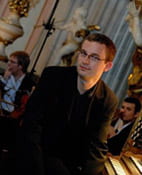 25 March 2011 | Grzegorz Fitelberg Concert Hall, Katowice
25 March 2011 | Grzegorz Fitelberg Concert Hall, Katowice
NOSPR, Polish Radio Choir, Michał Klauza – cond., Maciej Frąckiewicz – accordion
Dariusz Przybylski – … denn ich steure mit meinen Genossen über das dunkle Meer zu unverständlichen Völkern… concerto for accordion and symphony orchestra (World Premiere)
Zaid Jabri – Miłość i miłosierdzie for choir and orchestra
Zbigniew Bargielski – Za horyzontem. (Pieśni trzech wiatrów) for choir and orchestra
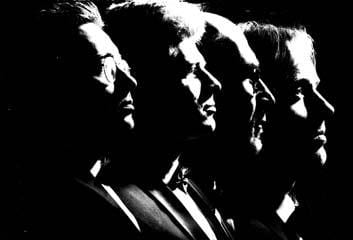 26 March 2011 | Music Academy Concert Hall, Katowice
26 March 2011 | Music Academy Concert Hall, Katowice
Silesian String Quartet: Szymon Krzeszowiec – violin I, Arkadiusz Kubica – violin II, Łukasz Syrnicki – viola, and Piotr Janosik – cello
Paweł Pietruszewski – QUARTUM
Jarosław Mamczarski – Quartet D
Bettina Skrzypczak – IV String Quartet
Krzysztof Meyer – XIII String Quartet op. 113
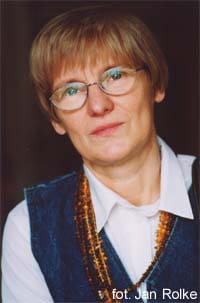 26 March 2011 | Music Academy Concert Hall, Katowice
26 March 2011 | Music Academy Concert Hall, Katowice
Gabriela Szendzielorz – piano, Andrzej Jungiewicz – piano, and Krzysztof Lasoń – violin
Jerzy Kornowicz – Dzwony od Nielisza (from the cycle Czas się żarzy) for 2 pianos
Dariusz Janus – Etiuda for 2 pianos
Wojciech Widłak – Po jesieni for solo violin
Katarzyna Stępniewska – Dzwony biją cały rok for solo piano
Grażyna Pstrokońska-Nawratil – Madrygał for 2 solo pianos (World Premiere)
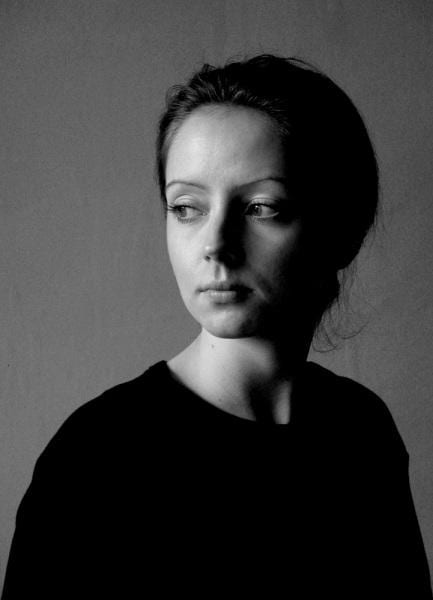 26 March 2011 | Grzegorz Fitelberg Concert Hall, Katowice
26 March 2011 | Grzegorz Fitelberg Concert Hall, Katowice
NOSPR, José Maria Florêncio – cond., Tomasz Strahl – cello, Rafał Kwiatkowski – cello, Lutosławski Piano Duo
Justyna Kowalska-Lasoń – Śpiewam Nowoczesnego Człowieka for syphonic orchestra (World Premiere)
Piotr Moss – Passions. Concerto for 2 cellos and orchestra
Maciej Jabłoński – Fuori. Concerto for 2 pianos, orchestra and electronics (World Premiere)
Mikołaj Górecki – Zan tontemiquico for orchestra (World Premiere)
 27 March 2011 | Grzegorz Fitelberg Concert Hall, Katowice
27 March 2011 | Grzegorz Fitelberg Concert Hall, Katowice
NOSPR, Szymon Bywalec – cond., Marek Rull Walarowski – piano, Anna Sikorzak-Olek – harp, Jurek Dybał – bass
Marek Rull Walarowski – Alternativo for piano and orchestra
Maciej Małecki – Concerto for electric harp and orchestra
Krzesimir Dębski – Stories for Double Bass and Orchestra
 27 March 2011 | Grzegorz Fitelberg Concert Hall, Katowice
27 March 2011 | Grzegorz Fitelberg Concert Hall, Katowice
AUKSO Chamber Orchestra, Marek Moś – cond., Piotr Pławner – violin, Urszula Kryger – mezzosoprano, Dominik Połoński – cello
Grzegorz Pieniek – Virtual Memories for 15 string instruments
Jacek Glenc – Lamentoso for string orchestra
Aleksander Nowak – Płacz dziecinko, płacz. Miniconcerto for violin and
chamber orchestra (World Premiere)
Bronisław K. Przybylski – Tutto è sciolto for voice and chamber orchestra
Sławomir Zamuszko – …set …rise for solo cello on the right hand and small symphony orchestra
[Sources: nospr.org.pl, pwm.com.pl]
Penderecki String Qtet Premiere Grella-Mozejko
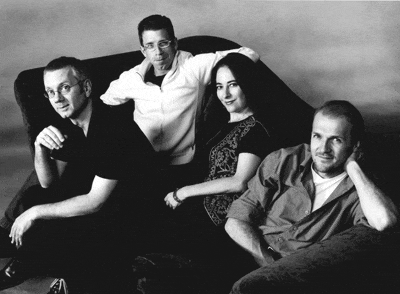 On March 12, the world-renowned Penderecki String Quartet returns to Edmonton with a gripping program of recent music called “Strong Strings,” presented by the Tonus Vivus Society. With a repertoire that ranges from the classic quartet repertoire to over 100 compelling new works written especially for them, the Penderecki Quartet’s concerts are thrilling musical events. Juno award winners, the group’s performances unfailingly garner praise for their emotional sweep, formidable power and intense musical sensitivity.
On March 12, the world-renowned Penderecki String Quartet returns to Edmonton with a gripping program of recent music called “Strong Strings,” presented by the Tonus Vivus Society. With a repertoire that ranges from the classic quartet repertoire to over 100 compelling new works written especially for them, the Penderecki Quartet’s concerts are thrilling musical events. Juno award winners, the group’s performances unfailingly garner praise for their emotional sweep, formidable power and intense musical sensitivity.
The March 12 concert features five member works all written since 2000 and demonstrate the breathtaking scope and audaciously rich expression of our music. The compositions include works by Darlene Chepil-Reid, Linda C. Smith, Ian Crutchley, Helve Sastok and will take the audience on a compelling (and often hair-raising!) ride through the vast expressive possibilities of the string quartet. Piotr Grella-Możejko’s work Acheron, written especially for this concert, will feature guest flutist Chenoa Anderson in an intensely vivid mix of strings, flute, electronics and video.
Tonus Vivus is proud to continue its long association with The Penderecki Quartet and to offer Edmonton an incredibly memorable evening of music that will juxtapose the subtle and the extreme, the traditional and the unexpected.
March 12, 2011 | 8 p.m.
“Strong Strings” concert, feat. Penderecki String Quartet
Ledcor Theatre, Art Gallery of Alberta
2 Sir Winston Churchill Square, Edmonton, Canada
Admission $20/$10 (students and seniors)/$5 (Tonus Vivus members)
[Source: press release]
Premiere Of Sofulak’s La Traviata
A new production of Verdi’s La Traviata—one of the most significant works in the operatic canon—featuring the directorial of debut of Karolina Sofulak premieres on March 5 at the Baltic Opera. Performers for the role of Violetta are Aleksandra Buczek, Iwona Hossa, Julia Iwaszkiewicz and Joanna Woś, and performing in the role of Alfredo are Paweł Skałuba andDariusz Stachura.
According to a report by culture.pl:
Karolina Sofulak graduated from the University of Warsaw with a degree in Western European philological and cultural studies, specialising in comparative literature. She holds a doctorate in British literature and has completed studies at the Ludwik Solski State Theatre School (in direction in Opera and Alternative Musical Theatre) as well as at the Academy of Music in Kraków. She has assisted David Alden in a production of Janáček’s Katia Kabanowa, Mariusz Treliński in a remake of Puccini’s Madame Butterfly, and Keith Warner in Wolfgang Amadeus Mozart’s Marriage of Figaro, to name but a few. Sofulak also interned at the Glyndebourne Opera Festival in 2010, working on a production of Mozart’s “Don Giovanni” under the direction of Jonathan Kent.
March 5, 6, 8, 9, 11, 12, 13 and June 4, 5, 10, 11, 12, 2011
Verdi’s La Traviata at the Baltic Opera
Baltic Opera House, Al. Zwycięstwa 15, 80-219 Gdańsk, Poland
tel. (+48 58) 763 49 12-3
[Sources: culture.pl, operabaltycka.pl, e-pomorskie.pl]
Lutosławski Studio At Risk
The governing board of Polish Radio had recently decided to rent the Lutosławski Studio S1 to the Kiepura Mazovian Musical Theatre for three years, starting in April. Many musicians, music lovers, critics and those who care about the use of this unique space have registered their strong opposition to this decision. Their petition on behalf of the Lutosławski Studio expresses belief that the rental of this space will cause the Public Radio untold damages resulting from the redecorations of the studio to suit the needs of a musical theatre group.
 The Lutosławski Studio was specifically built for recordings and concert performances and is known worldwide for its superb acoustics. It is also universally acknowledged to be the best such space in Central Europe. Recording companies from all over the world have used the Lutosławski Studio S1 for their projects and the planned rental of the space to another party would jeopardize its unique sound properties.
The Lutosławski Studio was specifically built for recordings and concert performances and is known worldwide for its superb acoustics. It is also universally acknowledged to be the best such space in Central Europe. Recording companies from all over the world have used the Lutosławski Studio S1 for their projects and the planned rental of the space to another party would jeopardize its unique sound properties.
In addition, according to the petition’s authors, having another tenant in that space would lead to the practical eviction of the Polish Radio Orchestra that, under the baton of Maestro Łukasz Borowicz, had made the Studio S1 its home for many year. This ensemble and its artistic director have specialized in performing and recording the repertoire of lesser-known Polish composers. Letting out the S1 Studio to the Kiepura Musical Theatre would inevitably lead to the cessation of Polish Radio Orchestra’s much-valued activities. The petition can be signed electronically at: www.petycje.pl/petycjePodglad.php?petycjeid=6614
[Sources: polmic.pl]
We Are More Campaign
 As governments and politicians of the European Union debate the next EU budget, which will affect the next ten years of cultural promotion activities (2014-2020), a campaign has been launched in support of the arts and culture throughout Europe. Called we are more, it is a Europe-wide arts advocacy campaign that seeks to mobilize everyone who cares about culture in Europe to influence the EU budget negotiations. The ultimate goal of the campaign is to contribute to a strengthened recognition of the role of arts and culture in the development of our European societies. More information about the concrete policy objectives of the campaign can be found here: www.wearemore.eu.
As governments and politicians of the European Union debate the next EU budget, which will affect the next ten years of cultural promotion activities (2014-2020), a campaign has been launched in support of the arts and culture throughout Europe. Called we are more, it is a Europe-wide arts advocacy campaign that seeks to mobilize everyone who cares about culture in Europe to influence the EU budget negotiations. The ultimate goal of the campaign is to contribute to a strengthened recognition of the role of arts and culture in the development of our European societies. More information about the concrete policy objectives of the campaign can be found here: www.wearemore.eu.
The we are more campaign was initiated by Culture Action Europe – the umbrella advocacy organization for the arts and culture in Europe. It is carried out in strategic partnership with the European Cultural Foundation. Culture Action Europe currently has over 100 members that together represent over 50,000 arts and culture players across Europe and beyond in more than 14 artistic disciplines. The campaign is run in an open source way, with tools on the campaign website that encourage and facilitate for the entire culture sector as well as individuals to get involved in and support the campaign.
[Sources: wearemore.eu, polmic.pl]
I, Culture Orchestra
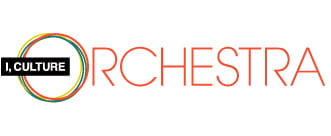 Following the auditions in Armenia, Azerbaijan, Georgia, Belarus and Ukraine, young Polish musicians have their chance to audition for the I, Culture Orchestra throughout the month of March in cities across Poland. The project is initiated by the Adam Mickiewicz Institute, the cultural wing of the Polish Foreign Ministry, and the international tour of this ensemble (see details below) will be one of the cultural highlights during the Polish Presidency of the Council of the European Union.
Following the auditions in Armenia, Azerbaijan, Georgia, Belarus and Ukraine, young Polish musicians have their chance to audition for the I, Culture Orchestra throughout the month of March in cities across Poland. The project is initiated by the Adam Mickiewicz Institute, the cultural wing of the Polish Foreign Ministry, and the international tour of this ensemble (see details below) will be one of the cultural highlights during the Polish Presidency of the Council of the European Union.
The project strives to promote young musical talents across Western Europe. Those who make the cut are set to perform later this year at the most prestigious concert halls of Europe. Scheduled concert venues include Berlin Philharmonic (November 2), Palais des Beaux-Arts in Brussels (November 4), Royal Festival Hall (November 6) in London and Teatro Real in Madrid (November 8). Other concerts are planned for the National Philharmonics of Warsaw, Minsk and Kiev.
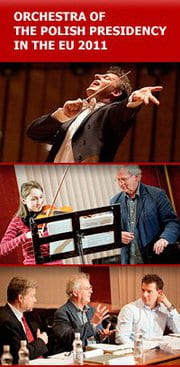 The orchestra’s members are young people from Poland, Ukraine, Belarus and other European countries to the east of European Union, including Moldavia, Azerbaijan, Armenia and Georgia. Poland, at the heart of Europe, has a long history of connecting the East and the West. On the occasion of the Polish Presidency of the EU Council, a key tenet is the influence that both the East and the West have had on the collective European cultural identity. Moreover, the Western societies ought to be reminded of the cultural richness and long-standing tradition of the European countries from beyond the eastern boundaries of the Schengen Area. The project aims to effect permanent change in the approach towards orchestral education in the participating countries and leave a strong impression on the musical map of Europe for future generations.
The orchestra’s members are young people from Poland, Ukraine, Belarus and other European countries to the east of European Union, including Moldavia, Azerbaijan, Armenia and Georgia. Poland, at the heart of Europe, has a long history of connecting the East and the West. On the occasion of the Polish Presidency of the EU Council, a key tenet is the influence that both the East and the West have had on the collective European cultural identity. Moreover, the Western societies ought to be reminded of the cultural richness and long-standing tradition of the European countries from beyond the eastern boundaries of the Schengen Area. The project aims to effect permanent change in the approach towards orchestral education in the participating countries and leave a strong impression on the musical map of Europe for future generations.
The Orchestra follows the example of such renowned ensembles as the European Union Youth Orchestra and the West-Eastern Divan Orchestra. The international experience with establishing such ensembles proves that they carry a tremendous social and political potential, and on the artistic level, they create a unique opportunity for the young musicians for professional development, building relations, while giving its young members a unique chance for travel and adventure across Europe.
As part of this project, young and talented musicians from Eastern Europe have the occasion to work under the direction of some of the most eminent teachers from the leading orchestras in Western Europe, such as the London Symphony Orchestra, Opera de Lyon, Philharmonia Orchestra and the City of Birmingham Symphony Orchestra.
[Sources: Adam Mickiewicz Institute via culture.pl, iam.pl]
New Kisielewski Book
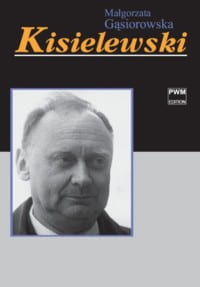 A new book written by Małgorzata Gąsiorowska and published by PWM Editions celebrates the 100th birthday of Stefan Kisielewski (1911-1991), a noted twentieth century Polish composer, writer and politician.
A new book written by Małgorzata Gąsiorowska and published by PWM Editions celebrates the 100th birthday of Stefan Kisielewski (1911-1991), a noted twentieth century Polish composer, writer and politician.
The launch of the volume on March 13, 2011, will include a special concert at the Lustosławski Studio Concert Hall in Warsaw. The concert will be carried live (7:00 p.m., local Warsaw time) by Polish Radio, Program 2. Several compositions by Kisielewski and his long-time friend, Grażyna Bacewicz will be featured on the program.
The concert will be performed Sinfonia Varsovia, with maestro Jacek Kaspszyk as conductor and pianist Julia Samojło as featured soloist.
Program
Grażyna Bacewicz – Overture;
Stefan Kisielewski – Fairground Ballet Suite (Wesołe miasteczko);
Stefan Kisielewski – Piano concerto;
Stefan Kisielewski – Concerto for chamber orchestra;
Adam Walaciński – Dramma e burla;
Stefan Kisielewski – Cosmos I for symphonic orchestra
In collaboration with the book’s author, the PWM Editions also organized an exhibit illustrating Stefan Kisielewski’s life and works. The virtual version of this exhibit can be found at: www.kisielewski.art.pl
March 13, 2011 | 7:00 p.m.
Stefan Kisielewski 1911-1991
Sinfonia Varsovia, Julia Samojło – piano, and Jacek Kaspszyk- conductor
Witold Lutosławski Polish Radio Concert Studio, Warsaw
Information & Tickets: sinfoniavarsovia.org
[Sources: polmic.pl pwm.com.pl, sinfoniavarsovia.org]
Adventures With Warsaw National Phil
 Warszawska Filharmonia Narodowa na pięciu kontynentach [The National Philharmonic on Five Continents] is a 640-page book by Marian Gołębiowski, the former administrative director of Poland’s foremost orchestra. This volume represents over three decades of research and covers all of the Warsaw Philharmonic’s travels between the years 1951-2009, including 1372 concerts and 128 concert tours. This richly illustrated album contains reproductions of programs, posters, and photos showing the musicians during rehearsals, concerts, and sightseeing.
Warszawska Filharmonia Narodowa na pięciu kontynentach [The National Philharmonic on Five Continents] is a 640-page book by Marian Gołębiowski, the former administrative director of Poland’s foremost orchestra. This volume represents over three decades of research and covers all of the Warsaw Philharmonic’s travels between the years 1951-2009, including 1372 concerts and 128 concert tours. This richly illustrated album contains reproductions of programs, posters, and photos showing the musicians during rehearsals, concerts, and sightseeing.
In addition, a text section entitled Zapiski melomana [Diary of a Music Lover] covers all kinds of events—musical and extra-musical, amusing and amazing—but always linked to various adventures of the ensemble on the road. Grouped in enticingly-titled essays, this fascinating book deserves a detailed exploration. It goes on sale on March 15 at the Bolero Music Bookshop at the Philharmonic Hall and all music bookstores throughout Warsaw.
[Sources: polmic.pl, filharmonia.pl]
30 Years Of The Silesian Chamber Orchestra
The Silesian Chamber Orchestra celebrated its thirtieth anniversary with a recent concert of works by Mieczysław Karłowicz, Edward Elgar, and Antonio Vivaldi. Additional performers included soloists Bożena Harasimowicz, Magdalena Witczak, Joanna Iwaszkiewicz, the Silesian Quartet, and the Silesian Philharmonic Choir, all conducted by Massimiliano Caldi. The performance was held in the concert hall of the Katowice Music Academy.
Founded in 1981 by Karol Stryja, the ensemble was conducted for many years by composer and professor of music Jan Wincenty Hawel, who also served as the ensemble’s artistic director. 25 years later the baton was passed on to Maestro Caldi, who now serves as the principal guest conductor.
The ensemble has 16 players and specializes in baroque, classical, and romantic music, but also includes music by the youngest generation of composers in their repertoire. The orchestra has toured Europe extensively, performing in over 180 concerts abroad, mainly in Germany, Austria, Czech Republic, France, Spain, and Italy. The Silesian Chamber Orchestra also recorded a number of albums, including music by Johann Sebastian Bach, Astor Piazzolla, and Krzysztof Komeda with pianist Waldemar Malicki. Their recording of Stanisław Moryto’s Cello Concerto (DUX 0534) was nominated for the 2006 Fryderyk Award and their “Little Big Music” disc with works by Britten, Lutosławski, Holst, and Kilar received excellent reviews. Their latest recording included the world premiere recording of Aleksander Tansman’s Clarinet Concerto, featuring the French soloist, Jean-Marc Fessard, and Maestro Mirosław Błaszczyk.
[Source: rmfclassic.pl]
Zubel Across America
Agata Zubel has been chosen as one of nine of the most exciting and innovative composers from around the world to be featured at San Franciso’s 16th annual Other Minds Festival of New Music (February 27 – March 5). The prolific composer and vocalist will perform across the U.S. this month, starting off in Chicago and then heading west to Seattle and San Francisco
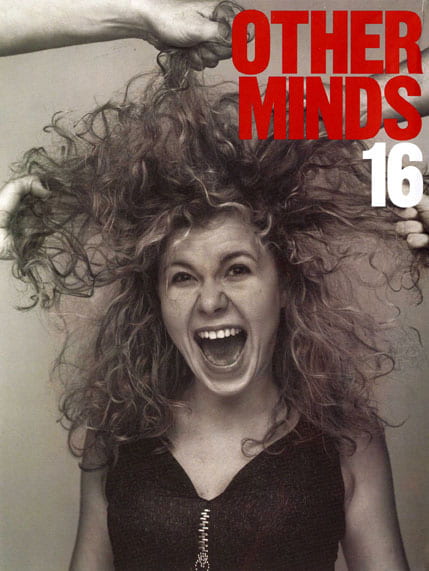 This 16th edition of the Other Minds Festival, with Director Charles Amirkhanian at the helm, continues an annual tradition of concerts and artists’ talks by the most creative voices from across the musical spectrum.The 2011 festival will also feature Louis Andriessen (Netherlands), I Wayan Balawan (Indonesia), Han Bennink (Netherlands), Kyle Gann (USA), Janice Giteck (USA), David A. Jaffe (USA), and Jason Moran (USA). In 2010 roku Paweł Mykietyn was a guest of this prestigious festival. This year Zubel is slated to perform on Thursday March 3 and Friday March 4, 2011, at 8:00 PM at Kanbar Hall in San Francisco.
This 16th edition of the Other Minds Festival, with Director Charles Amirkhanian at the helm, continues an annual tradition of concerts and artists’ talks by the most creative voices from across the musical spectrum.The 2011 festival will also feature Louis Andriessen (Netherlands), I Wayan Balawan (Indonesia), Han Bennink (Netherlands), Kyle Gann (USA), Janice Giteck (USA), David A. Jaffe (USA), and Jason Moran (USA). In 2010 roku Paweł Mykietyn was a guest of this prestigious festival. This year Zubel is slated to perform on Thursday March 3 and Friday March 4, 2011, at 8:00 PM at Kanbar Hall in San Francisco.
Two works by Zubel are to be presented during the festival: Cascando (2004) performed with the Seattle Chamber Players & Agata Zubel and Parlando (2000) performed by Agata Zubel (voice & electronics).
Apart from her performance at the Other Minds festival, Agata Zubel will also perform at two other U.S. events, co-organised by the Adam Mickiewicz Institute: March 1 at the Harris Theater for Music and Dance at the University of Chicago and on March 10 at the Chapel Performance Space w Seattle.
In Chicago, Zubel headlines with some excellent bands: eighth blackbird, Pacifica Quartet and Jason Marsalis Quartet (Jason Marsalis – vibraphone, Austin Johnson – piano, Will Goble – bass and David Potter – drums). Program: Paul Patterson, Lucian Beria, Fusun Koksal and Agata Zubel. Complementing the contemporary music repertoire is a concert of the famous Marsalis family member’s jazz quartet. On March 10 Zubel performs again with the Seattle Chamber Players, but this time in their home city.
More information can be found at www.otherminds.org or www.polishculture-nyc.org.
[Sources: press release via culture.pl, otherminds.org, polishculture-nyc.org; Photo: Tomasz Kulak/OM pamphlet
Szymanowski At NY Phil
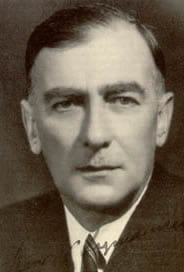 On March 3-5, the New York Philharmonic performs a program comprising Karol Szymanowski’s Violin Concerto No. 1, Op. 35 (1916) and Gustav Mahler’s Symphony No. 4. Performers include Daniel Harding, conductor, Glenn Dicterow, violin, and Lisa Milne, soprano. There will be a pre-concert talk beginning one hour before concert time for an additional cost of $7.
On March 3-5, the New York Philharmonic performs a program comprising Karol Szymanowski’s Violin Concerto No. 1, Op. 35 (1916) and Gustav Mahler’s Symphony No. 4. Performers include Daniel Harding, conductor, Glenn Dicterow, violin, and Lisa Milne, soprano. There will be a pre-concert talk beginning one hour before concert time for an additional cost of $7.
Thu., March 3*, 7:30 pm | Fri., March 4, 2:00 pm | Sat., March 5, 8:00 pm
New York Philharmonic plays Szymanowski
Lincoln Center – Avery Fisher Hall
10 Lincoln Center Plaza, New York, NY 10023
Info: (212) 875-5656
Tickets: $37.00-$79.00
*Open rehearsal 9:45 AM (about 3 hours)
[Source: email, nyphil.org]
Górecki – Sacred Sounds In Hartford
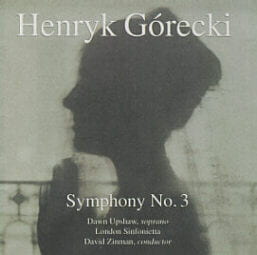 On Friday, March 11 Henryk Górecki’s Symphony No. 3 Sorrowful Songs will be performed at the Cathedral of St. Joseph in Hartford, CT. The concert is held in memory of the composer, who died last November, and Pope John Paul II. It will be performed by the New Haven Symphony Orchestra and world renowned soprano Paula Almerares. The Cathedral Choir will also sing Górecki’s motet Totus Tuus.
On Friday, March 11 Henryk Górecki’s Symphony No. 3 Sorrowful Songs will be performed at the Cathedral of St. Joseph in Hartford, CT. The concert is held in memory of the composer, who died last November, and Pope John Paul II. It will be performed by the New Haven Symphony Orchestra and world renowned soprano Paula Almerares. The Cathedral Choir will also sing Górecki’s motet Totus Tuus.
Friday, March 11 | 8:00 pm
Sacred Sounds Concert with music by Henryk Górecki
Cathedral of St. Joseph
140 Farmington Ave., Hartford, CT 06105
info@cathedralofsaintjoseph.com
Complimentary tickets: call Rectory Office at 860-249-8431
[Source: email, cathedralofsaintjoseph.com]
Latsabidze Plays Chopin’s 24 Preludes
 On Sunday, March 27, pianist Giorgi Latsabidze will perform all of Frederic Chopin’s 24 Preludes, op. 28, in his recital at USC’s Newman Recital Hall in Los Angeles. In a concert commemorating commemorate the 200th birthdays of both Robert Schumann and Frederic Chopin, the program will also include Schumann’s Kreisleriana, op. 16. Latsabidze is a former student of the USC Thornton School of Music and currently serves on the faculty of Azusa Pacific University’s School of Music.
On Sunday, March 27, pianist Giorgi Latsabidze will perform all of Frederic Chopin’s 24 Preludes, op. 28, in his recital at USC’s Newman Recital Hall in Los Angeles. In a concert commemorating commemorate the 200th birthdays of both Robert Schumann and Frederic Chopin, the program will also include Schumann’s Kreisleriana, op. 16. Latsabidze is a former student of the USC Thornton School of Music and currently serves on the faculty of Azusa Pacific University’s School of Music.
Giorgi Latsabidze is an international prize-winning concert pianist and composer of Georgian heritage. Latsabidze is one of the youngest pianists to have performed and recorded live all 24 of the Chopin Etudes and all 12 of the Transcendental Etudes of Franz Liszt. Learn more at Latsabidze’s official website, www.latsabidze.com.
[Source: press release, wikipedia.org, latsabidze.com]
Bochenek Plays Melodies
On Sunday, March 6, pianist Barbara Bochenek will present her graduation piano recital for the MFA program at the California Institute of the Arts. Entitled “Melodies by Gabriel Fauré: A Concert of French Art Songs,” the recital program will feature vocal works by Fauré. Other performers on the program are tenor Andrzej Stec, soprano Tory McKenna and Betsy Rettig.
Sunday, March 6, 2011 – 2:00pm
Barbara Bochenek: MFA Graduation Piano Recital
CalArts – Roy O. Disney Music Hall
[Source: Press release, calarts.edu]
Tensor In Concert
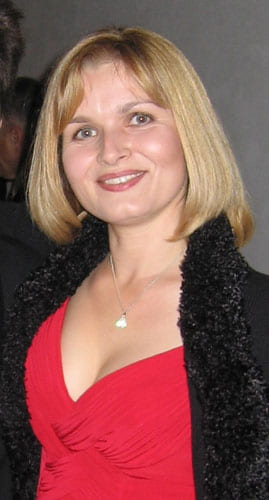 On Saturday, March 12, Polish soprano Yolanta Tensor will join Paul Salvo – trumpet and Polly Schaffner – piano for a spellbinding evening of familiar and beloved sacred and spiritual music at St. Paschal Baylon Church in Thousand Oaks, CA.
On Saturday, March 12, Polish soprano Yolanta Tensor will join Paul Salvo – trumpet and Polly Schaffner – piano for a spellbinding evening of familiar and beloved sacred and spiritual music at St. Paschal Baylon Church in Thousand Oaks, CA.
Saturday, March 12 | 7:00 PM
Yolanta Tensor in Concert
St. Paschal Baylon Church
155 E. Janss Rd., Thousand Oaks, CA 91360
[Source: press release]
Awards
Mykietyn Wins Polish Eagle
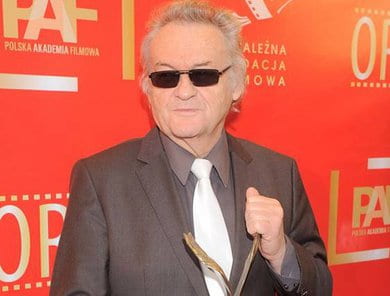 The 13th Polish Film Awards, “The Eagles,” were held during a celebratory gala in Warsaw on March7, 2011. Essential Killing, directed by Jerzy Skolimowski (pictured at right), was one of the most lauded films of the evening, winning the distinction of Best Music for composer Paweł Mykietyn as well as Best Film, Best Director and Best Editing (Reka Lemenhenyi and Maciej Pawliński).
The 13th Polish Film Awards, “The Eagles,” were held during a celebratory gala in Warsaw on March7, 2011. Essential Killing, directed by Jerzy Skolimowski (pictured at right), was one of the most lauded films of the evening, winning the distinction of Best Music for composer Paweł Mykietyn as well as Best Film, Best Director and Best Editing (Reka Lemenhenyi and Maciej Pawliński).
According to the Polish Music Information Centre in Warsaw:
Paweł Mykietyn [b.1971] embarked on his spectacular career at a very young age, and from the very start he notched up numerous successes both in Poland and abroad [2nd prize in the Andrzej Krzanowski Competition for Composers (1990), 1st prize for young composers’ works at the International Rostrum of Composers in Paris (1995), 1st for works by young composers and a recommendation in the general category at the 4th International Rostrum of Electroacoustic Music in Amsterdam(1996), among others]. In 1993, still as Włodzimierz Kotoński’s composition student, he made his Warsaw Autumn debut with La strada. The success of this performance resulted in the composer obtaining his first Warsaw Autumn commission – for the work entitled Eine kleine Herbstmusik which, performed in 1995, proved to be one of the greatest events of the Festival. In the same year, his composition 3 for 13, commissioned by the Polish Radio, won the 1st prize in the International Rostrum of Composers in Paris, in the category of works by young composers. In 1996, Mykietyn received the 1st prize in the same category of works, as well as a recommendation in the general category, in the 4th International Rostrum of Electroacoustic Music in Amsterdam, for his Epifora [Epiphora] for piano and tape (1996). The successive Warsaw Autumn festivals presented new works by Mykietyn: Piano Concerto in 1997, Commencement de siècle (1999), Shakespeare’s Sonnets (2000), and the opera Ignorant i szaleniec [The Ignoramus and the Madman] (2001).
Paweł Mykietyn’s music is impetuous, frequently even aggressive in character, and has a clear structure. The composer ostentatiously applies the major-minor harmonies, introducing tonal fragments interspersed with harmonically free sections. He also makes use of traditional melodic structures, transforming them in his own individual manner. Mykietyn could be described as a model postmodernist, deriving his inspiration as well as material from all the available sources without any inferiority complex. Composition is for him, to a large extent, the action of putting together ready-made puzzle pieces. Mykietyn’s music evokes many emotions. It is most admired by the younger audience, fascinated by powerful sound and sharp rhythms.
The nominees for the Polish Film Awards are chosen by the members of the Polish Film Academy, headed by director Agnieszka Holland. Polish Film Awards: The Eagles take place under the patronage of the Polish Ministry of Culture and National Heritage and with support from the Polish Film Institute and organization by the Independent Film Foundation (Niezależna Fundacja Filmowa). The leading partner of the Polish Eagles is PWC.
[Sources: filmneweurope.com, polmic.pl]
Fryderyk 2011 Nominations
 On February 23, the Audio and Video Producers’ Union and the Polish Recording Academy announced the nominees in thirty-four categories of classical, jazz, and popular music for the Polish “Fryderyks”—equivalent to the US Grammys. Winners will be announced at a gala in Warsaw on May 9. There were a total of 726 entries, including 101 classical albums, 29 jazz albums, 139 albums by foreign artists, 201 popular music albums, 147 Song of the Year Singles, and 97 music videos. The full list of albums and artists nominated is available here: www.polmic.pl/images/stories/pliki/FRYDERYK2011_Nominacje-powazna.pdf
On February 23, the Audio and Video Producers’ Union and the Polish Recording Academy announced the nominees in thirty-four categories of classical, jazz, and popular music for the Polish “Fryderyks”—equivalent to the US Grammys. Winners will be announced at a gala in Warsaw on May 9. There were a total of 726 entries, including 101 classical albums, 29 jazz albums, 139 albums by foreign artists, 201 popular music albums, 147 Song of the Year Singles, and 97 music videos. The full list of albums and artists nominated is available here: www.polmic.pl/images/stories/pliki/FRYDERYK2011_Nominacje-powazna.pdf
Artists who have made extraordinary contributions to Poland’s musical culture are honored every year with a Golden Fryderyk. It was announced that the Special Awards of the Golden Fryderyk will be given to Wojciech Młynarski in the Popular Music Category, and to Włodzimierz Nahorny in the Jazz Music Category. Jerzy Maksymiuk will receive the Special Golden Fryderyk in the Classical Music Category, joining such artists as Władysław Szpilman, Antoni Wit, Krystian Zimerman, Ewa Michnik, Henryk Mikołaj Górecki, and Krzysztof Penderecki who were honored in the past.
The entries eligible for the year 2011 cover albums published between December 1, 2009 and November 30, 2010, and must be entered either by the artist, the manager, the producer, or the recording company.
[Source: polmic.pl]
Gloria Artis
On February 22, 2011, the Minister of Culture and National Heritage, Bogdan Zdrojewski, award Polish composer Paweł Łukaszewski with the Gloria Artis Bronze Medal for Merits to Culture, which is conferred for distinguished contributions to Polish art and culture. Łukaszewski is an active composer, pedagogue, and organizer of musical events in Poland.
On March 1, 2011—Chopin’s 201st birthday—Minister Zdrojewski awarded Gloria Artis Golden Medals of Merit for “the Preservation of Fryderyk Chopin” during the closing ceremony of the Chopin Year at the National Philharmonic. Professor Mieczysław Tomaszewski—one of the most respected musicologists in Poland and a Chopin speicalist—was honored for popularizing the works of Chopin in Poland and beyond its borders. Due to illness, Prof. Tomaszewski was unable to receive his medal in person and instead it was accepted by his wife, Wanda Tomaszewska. The second Gloria Artis, a personal initiative of the Minister, was bestowed upon the Fryderyk Chopin Society in Warsaw and the President of the Chopin 2010 Celebrations Committee, Waldemar Dąbrowski. This Golden Gloria Artis “Medal for Cultural Merit” was given in recognition of the unquestionable merits of the entire Chopin Society and Mr. Dąbrowski in particular in protecting and promoting the legacy of the Great Composer.
[Source: lukaszewski.org.uk, polmic.pl]
Pendereckis Receive Knights Of Malta Crosses
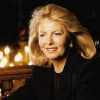 Polish composer Krzysztof Penderecki and his wife and fellow music organizer, Elżbieta Penderecka (left), were decorated with the Knights of Malta Crosses in Rome on March 7. This honor was bestowed upon the recipients in recognition of their work in promoting European cultural heritage by the Grand Master of the Order, Robert Matthew Festing. Krzysztof Penderecki received the Grand Cross Pro Merito Melitensi, whilst his wife was decorated with the Sovereign Military Order of Malta, the highest order that is given to women.
Polish composer Krzysztof Penderecki and his wife and fellow music organizer, Elżbieta Penderecka (left), were decorated with the Knights of Malta Crosses in Rome on March 7. This honor was bestowed upon the recipients in recognition of their work in promoting European cultural heritage by the Grand Master of the Order, Robert Matthew Festing. Krzysztof Penderecki received the Grand Cross Pro Merito Melitensi, whilst his wife was decorated with the Sovereign Military Order of Malta, the highest order that is given to women.
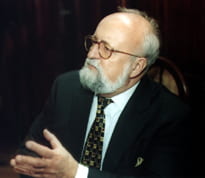 In his acceptance speech, Maestro Penderecki (right) referred to the Renaissance-era composer and theoretician Johannes Tinctoris, who described goals of music as “Pleasing the Lord, forcing the devil to flee, lift the earthbound minds, cure the ill, and bring succor in times of hardship.” In thanking the Order for conferring such a great honor upon him and his wife, Krzysztof Penderecki also recalled the words of his recently deceased friend, Henryk Mikołaj Górecki, who often quoted Father Michał Haller’s comparison of God to mathematics and Light to a mighty-sounding symphony.
In his acceptance speech, Maestro Penderecki (right) referred to the Renaissance-era composer and theoretician Johannes Tinctoris, who described goals of music as “Pleasing the Lord, forcing the devil to flee, lift the earthbound minds, cure the ill, and bring succor in times of hardship.” In thanking the Order for conferring such a great honor upon him and his wife, Krzysztof Penderecki also recalled the words of his recently deceased friend, Henryk Mikołaj Górecki, who often quoted Father Michał Haller’s comparison of God to mathematics and Light to a mighty-sounding symphony.
[Source: rmfclassic.pl]
Musica Sacra Competition
 The jury of the VII International Composers Competition “Musica Sacra 2011” met in Rouen, France from February 26-27. This Competition is organized by the Musica Sacra Institute in Warsaw and the Gaude Mater International Festival of Sacred Music in Częstochowa, with Paweł Łukaszewski as Director. Co-organizers and supporters include: Choeurs Saint-Evode, Cathedrale de Rouen, France; University of Cambridge, Trinity College Choir – Cambridge, UK; Jauna Muzika Vilnius Municipal Choir – Vilnius, Lithuania; and Polish Chamber Choir – Gdańsk, Poland.
The jury of the VII International Composers Competition “Musica Sacra 2011” met in Rouen, France from February 26-27. This Competition is organized by the Musica Sacra Institute in Warsaw and the Gaude Mater International Festival of Sacred Music in Częstochowa, with Paweł Łukaszewski as Director. Co-organizers and supporters include: Choeurs Saint-Evode, Cathedrale de Rouen, France; University of Cambridge, Trinity College Choir – Cambridge, UK; Jauna Muzika Vilnius Municipal Choir – Vilnius, Lithuania; and Polish Chamber Choir – Gdańsk, Poland.
In total, 34 compositions were submitted to the Competition from the following countries: Austria, Croatia, France, Netherlands, South Korea, Poland, Russia, USA, UK, and Italy. The jury was comprised of Marian Borkowski (Poland) – the President of the Jury, Vaclovas Augustinas (Lithuania), Thierry Escaich (France), Stephen Layton (Great Britain), and Jan Łukaszewski (Poland). The following awards were made:
- 1st Prize: Daniel J. Knaggs (USA) for Hic est discipulus ille
€2500, performance and recording during the Gaude Mater – International Festival of Sacred Music 2011 in Czestochowa (Poland) and 3 other performances in: Cambridge, Vilnius, Gdańsk. - 2nd Prize: Łukasz Urbaniak (Poland) for Psalm V
€1500, performance and recording during the Gaude Mater – International Festival of Sacred Music 2011 in Czestochowa (Poland) and 2 other performances in Vilnius, Gdańsk. - 3rd Prize: Mattia Culmone (Italy) for Cantate Domino
€1000, performance and recording during the Gaude Mater – International Festival of Sacred Music 2011 in Czestochowa (Poland) and 1 other performances in Vilnius, Gdańsk. - Special Prize of the Archbishop of Rouen: Alexander Campkin (U.K.) for Sancte Deus
€1.000, invitation and performance at The Courant d’Art Festival in Rouen (France)
[Source: competition.waw.pl]
Perotti Competition Results
 Several Polish-born singers were among the award recipients at the first Giulio Perotti Vocal Competition in Ueckermuende, Germany. The results were announced on February 11 and Egyptian soprano Fatma Said was the winner of the Grand Prix and the Special Prize Winner in her age category.
Several Polish-born singers were among the award recipients at the first Giulio Perotti Vocal Competition in Ueckermuende, Germany. The results were announced on February 11 and Egyptian soprano Fatma Said was the winner of the Grand Prix and the Special Prize Winner in her age category.
The First Prize winner in the 18-19 year old group was Polish soprano, Adriana Ferfecka (right), who also received a Special Prize for the best performance of the German-language song, Du bist die Ruh by Franz Schubert.
Among the college-age group the mezzo-soprano, Małgorzata Bartkowska was given the Special Award in her voice range, while Ewelina Siedlecka received the Award for Best Interpretation of a Twentieth Century Song in the graduate student category. There were 84 contestants from 11 countries and the organizers have already invited all interested vocalists to the Second Edition of the Competition, to be held in October 2012.
[Source: polmic.pl]
Festivals
Four Score Festival
The Music Institute of Chicago’s Four Score Festival, which annually highlights contemporary music, this year focuses on new music from Poland. The Festival will run from March 6-13 at Nichols Concert Hall in Evanston, IL. The Consul General of Poland, Zygmunt Matynia, will be in attendance.

The March 6 concert features works by Polish composers Marta Ptaszyńska, an award-winning composer and professor at the University of Chicago, and the late Henryk Górecki, described as “a leading figure of the Polish avant-garde during the post-Stalin cultural thaw.”
 The concert will be performed by MIC faculty Julia Bentley (mezzo-soprano), David Cunliffe (cello), Sang Mee Lee (violin), Patrice Michaels (soprano), Desiree Ruhstrat (violin), James Setapen (conductor and Academy program director), and Abraham Stokman (piano, Four Score Festival director), along with MIC President and CEO Mark George (piano), Director of Performance Activities Fiona Queen (piano and opera gongs), Assistant Director of Performance Activities Sam Nordlund (cello) and students in MIC’s Academy String Orchestra. Guest artists include Dominick Johnson (viola), Kevin Kosnik (percussion), Christie Miller (clarinet), Caroline Pittman (flute), Masahito Sugihara (saxophone), and members of the Fifth House Ensemble.
The concert will be performed by MIC faculty Julia Bentley (mezzo-soprano), David Cunliffe (cello), Sang Mee Lee (violin), Patrice Michaels (soprano), Desiree Ruhstrat (violin), James Setapen (conductor and Academy program director), and Abraham Stokman (piano, Four Score Festival director), along with MIC President and CEO Mark George (piano), Director of Performance Activities Fiona Queen (piano and opera gongs), Assistant Director of Performance Activities Sam Nordlund (cello) and students in MIC’s Academy String Orchestra. Guest artists include Dominick Johnson (viola), Kevin Kosnik (percussion), Christie Miller (clarinet), Caroline Pittman (flute), Masahito Sugihara (saxophone), and members of the Fifth House Ensemble.
The Four Score Festival puts the spotlight on the winners of its Generation Next Young Composer’s Competition and other young composers in a free performance on March 11, and the Festival concludes with a concert featuring contemporary Chinese composers Zhou Long and Chen Yi on March 13.
March 6-13
Four Score Festival feat. Ptaszyńska and Górecki
Music Institute of Chicago – Nichols Concert Hall
1490 Chicago Avenue, Evanston, IL
[Source: press release]
WUJek Festival
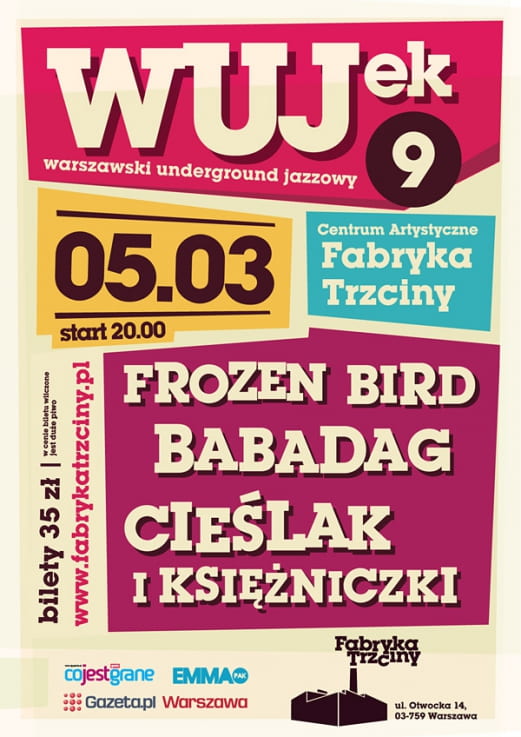 The WUJek Festival (Warszawski Underground Jazzowy / Warsaw Jazz Underground) aims to bring the most interesting independent improvisational bands from Warsaw to audiences looking for a fresher sound. All three bands performing at this year’s one-day event on March 5, 2011 experiment with musical form—across jazz, rock and avant garde—demonstrating an innovative approach to the song formula. Rather than limit themselves to the verse-chorus formula or to the typical instrumental setup of vocal-guitar-keyboard-bass-drums, these groups take a new spin on convention.
The WUJek Festival (Warszawski Underground Jazzowy / Warsaw Jazz Underground) aims to bring the most interesting independent improvisational bands from Warsaw to audiences looking for a fresher sound. All three bands performing at this year’s one-day event on March 5, 2011 experiment with musical form—across jazz, rock and avant garde—demonstrating an innovative approach to the song formula. Rather than limit themselves to the verse-chorus formula or to the typical instrumental setup of vocal-guitar-keyboard-bass-drums, these groups take a new spin on convention.
The Frozen Bird ensemble arranges fairy-like compositions for the piano, violin, accordion and tuba. The Babadag project utilizes such unconventional instruments as steel drum or glockenspiel, while Maciej Cieślak and his new group take a novel approach to the sounds of acoustic guitar and stringed instruments. These musicians explore how to move the traditional into the present in creative ways—with the pursuit of harmony and intriguing lyricism remaining at the heart of their efforts.
- The Frozen Bird Quartet, established in 2009, call their music “fairytale-tavern-chamber-music.” Songs in English and French tell the story of the protagonist’s journey through a city filled with peculiar characters, secret passages and magic objects. This specific music perfectly merges into the sleepy, smoky atmosphere of Warsaw clubs. The band is made up of musicians known from other improvising ensembles of Warsaw: Radek Duda (composer), Radek Polakowski, Piotr Janiec and vocalist and lyricist Julia Szproch.
- Babadag is a solo project initiated by Ola Bilińskia, a vocalist and song writer who decided to finally realize her ideas with a hand-picked line-up featuring Szymon Tarkowski, Hubert Zemler and Adam Byczkowski. Inspired by folklore, the band’s music is created by instruments of multiple cultural circles: glockenspiel, steel drum and banjo coexist with an electric guitar, bass, drums and looped sound samples. The musical strata is complemented and emphasized by visual installations by painter/animation artist Kuba Turczyński.
- Cieślak i księżniczki [Cieślak and the Princesses] was intended to be a one-time acoustic project of the guitarist and vocalist Maciej Cieślak while his original band Ścianka took a break. The project, however, became a full-blooded collective whose creative activity will not be suspended after their first album’s release. The princesses—cellists Karolina Rec and Edyta Czerniewicz and violinist Julia Ziętek—play, sing and emit forest-like sounds.
WUJek Festival | March 5, 2011
Fabryka Trzciny Art Centre
ul. Otwocka 14, 03-759 Warsaw
tel. (+48 22) 619 05 13
www.fabrykatrzciny.p
[Source: press release via culture.pl]
Jazz Nad Odrą Festival
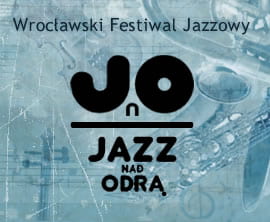 The 47th “Jazz on the Odra” Festival takes place in Wrocław, Poland from March 2 until March 6, 2011. Leszek Możdżer, Krzesimir Dębski, Piotr Wojtasik, Randy Crawford, Joe Sample and Joe Lovano are a few of the international jazz music stars set to perform in Wrocław at this major musical event. In addition to multiple daily concerts, there is an open Competition of Individuality in Jazz as well as jazz-related exhibitions and other events. For more information and a schedule of events, please visit culture.pl or jnofestival.pl.
The 47th “Jazz on the Odra” Festival takes place in Wrocław, Poland from March 2 until March 6, 2011. Leszek Możdżer, Krzesimir Dębski, Piotr Wojtasik, Randy Crawford, Joe Sample and Joe Lovano are a few of the international jazz music stars set to perform in Wrocław at this major musical event. In addition to multiple daily concerts, there is an open Competition of Individuality in Jazz as well as jazz-related exhibitions and other events. For more information and a schedule of events, please visit culture.pl or jnofestival.pl.
[Sources: culture.pl, jazznadodra.pl]
Discography
Fitelberg: Works For Violin & Piano
A review by Gary Fitelberg with supporting text by Maryla Renat
 GRZEGORZ FITELBERG: Complete works for violin & piano
GRZEGORZ FITELBERG: Complete works for violin & piano
Grzegorz Fitelberg: Violin Sonatas Op. 2 & Op. 12, Recitativ for clarinet and piano, Chanson Triste for piano, Romance without Words in D major op. 11 for violin and piano (2 ver,), Berceuse for violin and piano, and Mazurka for violin and piano
Andrzej Gebski – violin and Soyeon Lim – Piano
Acte Préalable AP0207
Jan A. Jarnicki and his distinguished Warsaw-based label, Acte Préalable, continue to champion rarely heard works from the Polish music literature. Their latest release focuses on Grzegorz Fitelberg, a famous conductor remembered these days mainly as a close friend of composer Karol Szymanowski. Fitelberg, however, was also a noted composer and this collection of rare World Premiere recordings includes his Violin Sonatas Op. 2 & Op. 12, Recitativ (more on this composition below), Chanson Triste, two versions of Romans bez słów [Romance without Words], Berceuse, and Mazurka.
The inspiration for this recording occurred when producer Jan A. Jarnicki came across Grzegorz Fitelberg’s compositions while browsing the archives of the Sibley Music Library at the Eastman School of Music in New York in 2005. Subsequently he initiated the Forgotten Polish Music Festival and then recruited featured artists violinist Andrzej Gebsi and pianist Soyeon Lim for this archival sound recording.
Grzegorz Fitelberg (1879-1953) is recognized as one of the greatest Polish conductors and promoters Polish music during the first half of the twentieth century. Specializing in premieres of new music, he became known as the “Ambassador of Polish Music.” Prior to becoming a famous yet forgotten conductor, however, he began his musical career as a composer and violinist, and nearly all of his early compositions were scored for violin and piano. Fitelberg received his musical training and tutelage from the eminent teachers Miecysław Barcewicz (violin) and Gustav Rogulski, and later Zygmunt Noskowski (theory and composition), before moving away from composition to focus on his career as a conductor.
Together with Karol Szymanowski, Ludomir Różycki, Mieczysław Karłowicz, and Apolinary Szeluto, Fitelberg belonged to a group of Polish composers who were part of the modernist movement in Polish music, literature and visual arts known as Młoda Polska [Young Poland]. Under the patronage of Prince Władysław Lubomirski, music by the Młoda Polska composers was presented at a number of concerts in Warsaw, Vienna and Berlin during the first decade of the twentieth century.
Many comments and reviews (sometimes contradictory) written by Alexander Polinski, Adolph Chybinski and Zadislaw Jachimecki were dedicated to the young Fitelberg’s symphonic output, and undoubtedly his symphonies added significantly to the development of Polish music of that genre. However, there has been less discussion of the role of Fitelberg’s music within the history of Polish violin music at the turn of the twentieth century. These early works for violin and piano can be seen as a genuine, significant link in the development of Polish violin literature and one cannot help but wonder why they are so rarely heard in Polish concert halls. It is true that Grzegorz Fitelberg’s great career as a conductor somewhat overshadowed his achievements as a composer, but these artistically valuable works are preserved and published (with the exception of the Sonata No. 1 in A minor) and merit greater inclusion in the violin repertoire of today. This present recording aims to promote this purpose.
With the 1903 Violin Concerto, Fitelberg’s interest shifted towards writing for larger ensembles and, during the next decade he wrote two symphonies, symphonic poems, overtures and rhapsodies for orchestra. Recording Fitelberg’s orchestral works could be the next project for some enterprising musicians and this intrepid label, providing much-needed insight into the legacy of this still largely unknown composer.
Fitelberg’s Recitativ
A collection of historical recordings by Gary Fitelberg
Little if any mention is ever made with respect to the Jewish origin and roots of composer Grzegorz Fitelberg, and yet these origins are very important to his compositional development. One of his compositions, known simply as Recitativ (1918) is actually a traditional Klezmer composition for clarinet and piano in two movements—Adagio and Recitativ—known as Tzu der Chuppah [To the Wedding Canopy]. The Jewish names for these two movements are Kale-Besezen [Preparing the Bride] and Procession.
Fitelberg’s version of this traditional song is dedicated to the famous clarinetist Simeon Bellison and was arranged by him. The piece was composed in 1918 and later published by Jibneh-Verlag in Austria.
Grzegorz Fitelberg and Simeon Bellison undoubtedly became acquainted during 1914-20, when Fitelberg was conductor of the St. Petersburg Imperial Opera in which Bellison served as clarinetist. They probably reconnected when Fitelberg came to New York while Bellison was principal clarinetist of the New York Philharmonic after WWII. These two were ardent admirers of each other’s musical talents.
While Recitativ has been recorded on several CD’s, confusing attributions or little mention of Fitelberg on CD covers or in program notes is very common.
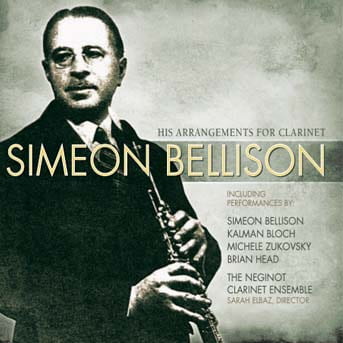 The best known recording of Recitativ or Tzu der Chuppah was masterfully performed by Kalman Bloch, former student of Simeon Bellison and clarinetist for the Los Angeles Philharmonic, who resurrected the work from obscurity. It is available on the compilation entitled SIMEON BELLISON – His Arrangements for Clarinet, released by the Summit Records (Summit CD 503) in 2008, featuring Bloch and John Steele Ritter on piano. This archival recording of the original version sets the standard for all other recordings.
The best known recording of Recitativ or Tzu der Chuppah was masterfully performed by Kalman Bloch, former student of Simeon Bellison and clarinetist for the Los Angeles Philharmonic, who resurrected the work from obscurity. It is available on the compilation entitled SIMEON BELLISON – His Arrangements for Clarinet, released by the Summit Records (Summit CD 503) in 2008, featuring Bloch and John Steele Ritter on piano. This archival recording of the original version sets the standard for all other recordings.
 Another creative and intriguing version of this work is an adaptation by the Wolford / Rosenblum Duo for saxophone and piano on their CD Laughter Without Tears (Centaur CRC 2521). The saxophone lends an earthier and sexier rendition of the classical Klezmer composition, as it is brought to life by saxophonist Dale Wolford and pianist Ivan Rosenblum. These two superb musicians render a soulful performance that is sweet to the ears.
Another creative and intriguing version of this work is an adaptation by the Wolford / Rosenblum Duo for saxophone and piano on their CD Laughter Without Tears (Centaur CRC 2521). The saxophone lends an earthier and sexier rendition of the classical Klezmer composition, as it is brought to life by saxophonist Dale Wolford and pianist Ivan Rosenblum. These two superb musicians render a soulful performance that is sweet to the ears.
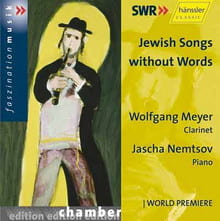 These two recordings plus a third performed by pianist/ehtnomusicologist Jascha Nemtsov and clarinetist Wolfgang Meyer—Jewish Songs without Words (Hanssler Classics)—are perhaps the best ones and my personal favorites.
These two recordings plus a third performed by pianist/ehtnomusicologist Jascha Nemtsov and clarinetist Wolfgang Meyer—Jewish Songs without Words (Hanssler Classics)—are perhaps the best ones and my personal favorites.
An Atma Classique release from April 1999 (ACD22187) offers the listener a perfect performance by André Moisan, clarinet and Louise-Andrée Baril, piano. Under the listing of S. Bellison’s Vier herbräische Melodien, Recitativ is performed under the title given on the original printed composition—Zur Trauung (G.Fitelberg)—and is a lengthier version than the others. Finally, Melisma Records (MELI 7170-2) offers us a classic version performed by Heiner Rekeszus on clarinet and Erika le Roux on piano.
Known concert performances of this composition include the following:
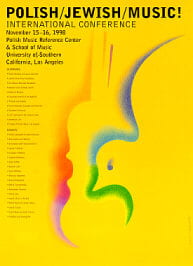 At the Polish/Jewish/Music! International Conference on November 15-16, 1998, featuring clarinetist Zinovy Gory and pianist Neil Brostoff. Organized by the Polish Music Reference Center and School of Music at the University of Southern California.
At the Polish/Jewish/Music! International Conference on November 15-16, 1998, featuring clarinetist Zinovy Gory and pianist Neil Brostoff. Organized by the Polish Music Reference Center and School of Music at the University of Southern California.
- The Jewish Music Commission of Los Angeles presented A Little Jewish Night Music at Valley Beth Shalom, Lopaty Hall, 15739 Ventura Blvd., Encino CA on November 29, 2005 at 7:30 p.m., with Zinovy Goro on clarinet and Guy Hallman on piano.
- A special tribute was presented by clarinetist Zinovy Gory (who arranged the clarinet and piano composition for orchestra) and the Los Angeles Jewish Symphony at L’CHAIM (TO LIFE!): A Musical Celebration Of Eastern European Culture—Sunday, August 9, 2009, Ford Theatre (World Premiere performance).
- On May 27, 2010 at the The Sidney Krum Young Artists Concert Series at YIVO in New York City, with performers Chris Pell, clarinet, and Robert Buxton, piano.
One can also listen to this magical piece in the Julliard School “Listening Room”:
- Clarinet and Piano Duo – Moran Katz, clarinet; Eliran Avni, piano present Grzegorz Fitelberg’s Four Hebraic Pictures in the Klezmer Tradition, arranged by Simeon Bellison: The Wedding (The Preparation of the Bride, Adagio Recitativo) available here: www.juilliard.edu/student-life/career/hire-performers/listening-room.php
Gary Fitelberg is a Polish-American author, biographer, music historian and musicologist.
Maryla Renat (b. 1958) is a Polish musicologist, music theorist and educator. A graduate of the Academy of Music in Katowice’s Department of Composition and Music Theory (1983) and Department of Instrumental Pedagogy (violin, 1989), she obtained her doctoral degree in humanities at the Art Institute of the Polish Academy of Sciences in Warsaw (1998) with a dissertation on the Evolution of the compositional technique of Grażyna Bacewicz. She serves as assistant professor in the Music Department of the Jan Długosz Institute of Art Education in Częstochowa, and since 2008, has been head of the Department of Theory. She is a candidate for membership in the Polish Composers Union. Dr. Renat is the author of many articles, both academic and popular. In 2004 she won first prize at the Muzyka21 Competition for an essay entitled “The Forgotten Music of Poland,” focused on the Violin Concertos of Emil Młynarski.
[Sources: culture.pl, woodwind.org, polmic.pl]
Chopin’s Own Piano
 Chopin’s Own Piano
Chopin’s Own Piano
Chopin: Berceuse Op. 57, Barcarolle Op. 60, Scherzi Op. 20 & 31, Fantasy Op. 49, Nocturne Op. 27 No. 2, Ballade in F minor Op. 42, Polonaise in A flat major Op. 53
http://www.samhaywood.com/contact.htm
This album was recorded on Chopin’s own Pleyel piano (part of the Cobbe Collection), an instrument restored by David Winston with piano tuning by Tim Wrench. Pianist Sam Haywood has performed to critical acclaim all over the world as concerto soloist, recitalist and chamber musician. He performs regularly with Joshua Bell and Steven Isserlis and has recorded extensively for radio and CD. His latest release, recently chosen as ‘CD of the Week’ on Radio 3’s Sunday Morning programme, is the first recording to have ever been made on Chopin’s own Pleyel piano of 1846. Earlier this year he appeared in twenty-one cities in USA and Canada with Joshua Bell and performed Beethoven’s Triple Concerto with Steven Isserlis, Jannis Georgiadis, Hobart Earle and the Athens State Orchestra. Forthcoming engagements include solo and chamber music recitals in UK, Germany, Indonesia, Japan, South America, Poland, Austria, Russia, Switzerland, USA and the Czech Republic
Chopin On Blu-Ray
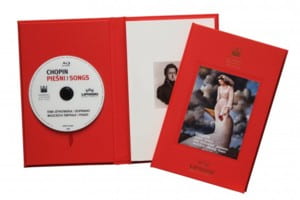 Chopin’s Songs
Chopin’s Songs
Ewa Iżykowska, soprano and Wojciech Świtała, pianist
Narodowej Kolekcji Muzycznej
www.empik.com
A Collectors’ Edition of Chopin’s Songs performed by soprano Ewa Iżykowska and pianist Wojciech Świtała came out recently on Blue Ray disc. The recording was made during a concert at the Salle du Conservatoire in Paris, where Chopin had been heard in performance as well. The piano used for the concert was Chopin’s Pleyel dating from 1843 and the event was recorded by the leading Polish expert, Andrzej Lipiński, using stereo surround sound technology. The historical ambience of the Conservatoire and the unique sound of Chopin’s piano were captured on film during the October 28, 2010 concert, which was attended by international dignitaries and diplomats.
Chopin’s Songs represent the second entry in the catalogue of Blue Ray discs featuring Polish music. A recording of Henryk Mikołaj Górecki’s Third Symphony led by the composer has launched the so-called National Music Collection Series that will honor the most important artists in the history of Polish music. The next projects in this series will include Karol Szymanowski’s opera, Król Roger, and violin concertos by Henryk Wieniawski.
Performances
Blechacz Conquers S.F.
A review by Caria Tomczykowska, Polish Arts and Culture Foundation (PACF)
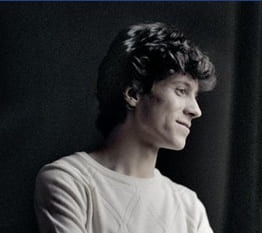 What a day! Herbst Theatre holds 916 people and it was filled to capacity. Rafał Blechacz’s playing is beyond belief with hands which look too similar to Chopin’s to ignore.
What a day! Herbst Theatre holds 916 people and it was filled to capacity. Rafał Blechacz’s playing is beyond belief with hands which look too similar to Chopin’s to ignore.
Szymanowski’s complex Sonata No. 1 in C minor was perfect. Mozart’s Variations K. 264, Debussy’s L’isle joyeuse, and Chopin’s first two Ballades, Polonasies Op. 26, and Four Mazurkas Op. 41 completed the musical feast. How lucky it was to be in the audience, let alone in the first row! After three encores both he and the Steinway needed a rest.
The CDs sold out within minutes—much to the disappointment of 100 or more who didn’t get to have their copy autographed. After the lobby emptied and a fabulous photo session near City Hall, Rafał’s entourage meandered up MacAllister to Indigo Restaurant where more than 70 adoring fans greeted him with the first of several rounds of Sto Lat!
Chopin vodka was poured in plentiful amounts before a sumptuous dinner was served with fantastic wines from Sterling Vineyards. Several GB of photos were taken by the guests and Marcin Sieradzki, the official PACF photographer. After dozens of autographs, thousands of smiles and twice as many flashes, the evening drew to a moonlit close for Rafał and us all. We wish it could have gone on until morning, but even Cinderella had a curfew.
The chef and staff at Indigo outdid themselves and we will be sure to return there again.
Rafał Blechacz should perform at Davies Hall with the San Francisco Symphony soon – Bravo Rafał!
[Photo: Felix Broede/DG]
Wunder & Chopin In Barboursville
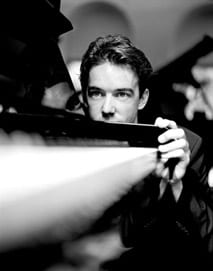 On February 24, the 7th Annual “Chopin in Barboursville” Concert was held in Barboursville Vineyards, Virginia. This year’s concert featured the world-renowned pianist Ingolf Wunder, the second-place winner in the 2010 International Chopin Piano Competition in Warsaw, Poland. The concert was presented by The Chopin Foundation of the United States and Premier Virginia Properties.
On February 24, the 7th Annual “Chopin in Barboursville” Concert was held in Barboursville Vineyards, Virginia. This year’s concert featured the world-renowned pianist Ingolf Wunder, the second-place winner in the 2010 International Chopin Piano Competition in Warsaw, Poland. The concert was presented by The Chopin Foundation of the United States and Premier Virginia Properties.
Remembering Wiktor Łabuński, cont.
The Łabuński Seven-Year Itch
by Joseph A. Herter, Warsaw
Nearly seven years have passed since the article I wrote on Wiktor Łabuński appeared in the September 2004 issue of the Polish Music Newsletter (Vol. 10 no. 9). Things have been fairly quiet on the Łabuński front since then. The University of Missouri—Kansas City Conservatory marked their centennial a few years ago, and included the establishment of endowed scholarship fund in memory of this famous Polish-American musician as part of their anniversary celebrations. Also, Wiktor’s Variations on a Theme by Paganini can now be found on You Tube, played by a young aspiring pianist.
In January 2011, the PMC forwarded an e-mail to me that had been sent by one of Łabuński’s grandchildren. They had just recently discovered the article on their grandfather and wished to make contact with me. In February, one more letter appeared out of the blue from another former Łabuński student—Milton Granger—who also had just came across the same article on the internet. Mr. Granger asked if it was still possible to include his fond memories of his former professor. The article which follows is the answer to his request, and it will eventually be included in the original article of 2004.
As a 12-year-old child prodigy, Mr. Granger had the distinction of having performed in what is believed to have been the first triple simulcast using both radio and television broadcasting facilities in the United States. The historical event took place on December 15, 1959 with the Kansas City Philharmonic orchestra performing Łabuński’s Concertino in C Minor for Piano with Milton Granger as the soloist. The performance was simultaneously broadcast on KCMO, KCMO-FM and Channel 5 in order to create a stereophonic effect.
As an adult, though, Granger spent a great part of his musical career with opera and the musical theater. As a composer, he has to his credit six chamber operas, seven musical plays and two children’s musicals. Two of his operas have been first-place prize winners of the National Opera Association. He has also been the conductor and/or pianist for over a score of musicals on Broadway, off-Broadway and in Europe. Currently, you can hear him play in Mary Poppins on Broadway. Mr. Granger resides in New Jersey.
Milton Granger
My first piano teacher was Cecilia Uribe, whose niece Blanca Uribe1 was a student of Łabuński’s and a well-known pianist in her own right. Cecilia taught me for a year then turned me over to Wanda Łabuński, and I had lessons in their home at 5801 Grand for two years. Then Wanda turned me over to her husband Wiktor when I was still a kid in grade school. And he was Wiktor Łabuński! I was permanently intimidated.

They were quite the contrasting couple. Wanda was vibrant, enthusiastic, always laughing. Wiktor was droll, formal, and a little aloof. They complemented each other beautifully. Wanda would hold studio recitals in their home, and she got everybody’s attention by playing glissandos on both pianos simultaneously. You had to see it to understand how it was done.
Every Christmas Wanda would make nut tortes, a special Polish recipe. Each of these contained at least two million calories, but they were unbelievably delicious. You had to slice each piece razor-thin, and even then one piece would leave you feeling stuffed. I’ve never run across anything like them since.2
As with several other students, Wiktor introduced me to Artur Rubinstein.3 I played a few pieces for Rubinstein, who gave me an autographed photo—still one of my prized possessions.
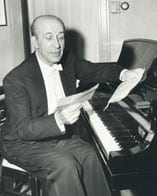 He was always thinking of opportunities for his students, and he knew everybody on the musical scene in Kansas City. Hans Schweiger, the conductor of the K.C. Philharmonic, came to one of my recitals, thanks to Wiktor. That’s how the radio-TV simulcast, mentioned in Mr. Herter’s article, came about. Łabuński’s Concertino is a delightful piece, beautifully structured, tuneful, and ideal for young players. I don’t believe it was ever published, but if someone can find it and distribute it, I think there are lots of teachers and students who would enjoy it. I can’t find my copy! (I guess I’ve moved too many times.) I played many of Wiktor’s works, and liked them all, but that was a particular favorite. I can still whistle the main themes!
He was always thinking of opportunities for his students, and he knew everybody on the musical scene in Kansas City. Hans Schweiger, the conductor of the K.C. Philharmonic, came to one of my recitals, thanks to Wiktor. That’s how the radio-TV simulcast, mentioned in Mr. Herter’s article, came about. Łabuński’s Concertino is a delightful piece, beautifully structured, tuneful, and ideal for young players. I don’t believe it was ever published, but if someone can find it and distribute it, I think there are lots of teachers and students who would enjoy it. I can’t find my copy! (I guess I’ve moved too many times.) I played many of Wiktor’s works, and liked them all, but that was a particular favorite. I can still whistle the main themes!
I wasn’t as serious a student as Wiktor would have liked, but he never gave up hope, and I did go on to major in music at Northwestern. He recommended a teacher, and when I had a chance to play a recital in Chicago’s Orchestra Hall he counseled me, “New audience, old music”—one of the many pieces of advice that I should have taken, but didn’t. Another remark of his never leaves me: One day he said to me, “Are you listening to yourself? I don’t think so. So many pianists don’t listen to themselves.” At the time I just thought, well of course, I’m listening to myself; I’m not deaf. But as the years go by I understand more and more what he means. Now when I do really listen to the way I’m playing I know I’m doing it for him.
Once he took me backstage after a concert by Hans Richter-Haaser4, and when he began chatting with Richter-Haaser, the first thing he said to him was, “Which language shall we speak?” That’s a question I’ve never asked anybody, to my endless regret.
He thought a pianist should not wear hand jewelry—also wise advice. I got married the first time when I was still in college and wore a wedding ring, commenting that despite the injunction against jewelry, wedding rings were of course perfectly acceptable. He murmured, “Not so much acceptable as inevitable.” Vintage Łabuński: funny, but polite and true. I have since remarried and do not wear a ring.
My first wife and I once attended a senior recital at UMKC, a pianist struggling through literature much too difficult for him. He had a terrible case of flop-sweat, and would sometimes stop in the middle of a piece to pull out a handkerchief and wipe his brow, then go back to missing notes and mangling phrases. We wanted to be supportive and sympathetic, but it was also pretty funny, and we spent most of the recital trying not to laugh. On our way out we passed by Dr. Łabuński, who dispassionately remarked, “That was not only the worst performance of the Liszt Sonata I’ve ever heard, but the worst performance of any work.” No anger, just a statement of fact. My wife and I couldn’t stop laughing for the next few hours.
For my senior recital we were required to prepare one piece without the teacher’s guidance, and I chose a Prokofiev Sonata. Wiktor was just as well pleased. He didn’t care for Prokofiev; they had been students at the St. Petersburg Conservatory together! He still spoke disdainfully of Prokofiev’s unusual technique (hardly the graceful elegance that Wiktor displayed), and I think he found Prokofiev’s music rude and bullying.
 His recitals at the Conservatory were wonderful events. When I first began studying with him, he would do a series of three concerts every summer, usually on a certain theme (The Magic of Chopin was one), and he would introduce each work with knowledgeable background information, amusing anecdotes, insightful commentary. Someone should have been running a tape recorder.
His recitals at the Conservatory were wonderful events. When I first began studying with him, he would do a series of three concerts every summer, usually on a certain theme (The Magic of Chopin was one), and he would introduce each work with knowledgeable background information, amusing anecdotes, insightful commentary. Someone should have been running a tape recorder.
Thanks for inspiring these memories. Keep up the excellent work!
Milton Granger, composer/pianist/conductor
Former Professor of Music, Hollins College, Roanoke, Virginia
Nutley, NJ
www.miltongranger.com
1 A native of Columbia, Uribe was the only Łabuński student to take part in the International Chopin Competition in Warsaw where she won an Honorable Mention in 1965. She became professor of music at Vassar College, and returned to Columbia upon retirement.
2 The dessert in question could have been Kutia, which is Ukrainian in origin but very popular in Eastern Poland. It is made from dried fruit, ground almonds, poppy seeds and a massive amount of honey. However, Mr. Granger insists that this dessert was a round-shape cake with heavy chocolate frosting with the thick texture of a candy bar. In an email he writes, “They were also a Christmas cottage industry for her. She sold them for $10 each, which was a lot of money for a dessert in the late 1950’s.”
3 Rubinstein was married to Wanda’s sister Aniela. They were daughters of the famous conductor Emil Młynarski. Thus, Rubinstein was Wanda’s bother-in-law.
Obituaries
Bohdan Pociej
Bohdan Pociej, one of Poland’s most distinguished music critics, musicologists, and author of books about music, died on March 3 at the age of 78. He studied Polish literature and later musicology at Warsaw University, and graduated in 1959. He was a frequent contributor to Poland’s foremost musicological journal, Ruch Muzyczny, where he worked as Editor until his retirement in 1994. Pociej’s essays frequently appeared in Tygodnik Powszechny, Nowe Książki, Więź, Znak, and Twórczość, among others.
Bohdan Pociej also closely collaborated with Polish Radio, hosting dozens of program series, including “Music as History of Sound,” “Bach and the Art of the Fugue,” “Questions of Form in Baroque Compositions,” and “Music in the Sphere of Thought,” among others. Since 1963 he was a member of the Polish Composers’ Union [ZKP] and since 1994 a member of the Polish Writers’ Union. His written legacy amounts to several hundred articles, essays and many books, including his last, Existing in Music: An Attempt to Define the Opus of Henryk Mikołaj Górecki, published in Katowice in 2005.
[Source: polmic.pl]
Danuta Idaszak
Danuta Idaszak, a well-known musicologist specializing in the history of Polish music in the 18th and 19th centuries, died on February 27, 2011, at 81 years old. During the years 1955-1992 she headed the Library of the Musicology Institute at the Warsaw University and authored several catalogues describing musical manuscripts from the city of Gniezno and Grodzisk Wielkopolski. She was also a member of Polish Composers’ Union [ZKP] since 1965.
[Source: polmic.pl]
Anniversaries
Born This Month
- 1 March 1810 – Fryderyk Chopin, virtuoso pianist, composer
- 2 March 1927 – Witold Szalonek, composer (d. 2001)
- 3 March 1922 – Kazimierz Serocki, composer, co-founder of the Warsaw Autumn Festival
- 6 March 1785 – Karol Kurpinski, composer, father of national opera
- 6 March 1835 – Ludwik Grossman, composer, pianist, and piano merchant (d. 1915)
- 7 March 1911 – Stefan Kisielewski, composer, essayist, writer
- 10 March 1937 – Bernadetta Matuszczak, composer
- 14 March 1913 – Witold Rudzinski, composer
- 17 March 1901 – Piotr Perkowski, composer
- 17 March 1925 – Tadeusz Prejzner, composer, jazz pianist(d. 2010)
- 18 March 1961 – Hanna Kulenty, composer
- 21 March 1936 – Marek Stachowski, composer
- 23 March 1933 – Andrzej Trzaskowski, composer, jazz pianist and conductor
- 23 March 1888 – Lidia Kmitowa, violinist and teacher (d. 1980)
- 27 March 1927 – Joachim Olkusnik, composer
- 28 March 1954 – Pawel Szymanski, composer
Died This Month
- 1 March 2004 – Janina Garscia, composer of music for children and teachers
- 2 March 1887 – Wilhelm Troschel, singer and son of piano maker
- 2 March 2010 – Wanda Tomczykowska, founder Polish Arts and Culture Foundation [PACF] of San Francisco (b. 29 August 1921)
- 3 March 2011 – Bohdan Pociej, critic, musicologist, author
- 4 March 1939 – Józef Sliwinski, pianist, composer (b. 1862)
- 4 March 1925 – Maurycy (Moritz) Moszkowski, composer and pianist (b. 1854)
- 4 March 1895 – Stanislaw Niedzielski, singer (baritone), choral conductor.
- 14 March 1954 – Ludomir Rogowski (b. 3 Oct 1881)
- 15 March 1883 – Karol Studzinski, violinist (b. 1828)
- 15 March 1948 – Konrad Neuger, conductor, active in the U.S. since 1931 (b. 1890)
- 16 March, 2010 – Tadeusz Prejzner, composer, jazz pianist(b.1925)
- 19 March 1876 – Józef Stefani, composer, conductor, violinist, son of Jan (b. 1800)
- 21 March 1973 – Antoni Szalowski, composer
- 22 March 1893 – Adam Herman Hermanowski, cellist, child prodigy and virtuoso (b. 1836)
- 29 March 1937 – Karol Szymanowski, composer, pianist (b. 1882)
- 29 March 1959 – Zdzislaw Szulc, curator of music instruments museum in Poznan
- 31 March 1880 – Henryk Wieniawski, composer, virtuoso violinist (b. 1835)
- 31 March 1946 – Aleksandra Stromfeld-Klamzynska-Szuminska, soprano (b. 1859)



